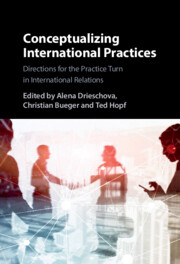Book contents
- Conceptualizing International Practices
- Conceptualizing International Practices
- Copyright page
- Contents
- Figures
- Table
- Contributors
- Acknowledgements
- Part I Introduction: Conversations and the Evolution of Practice Theorizing
- Part II Key Concepts of IR Scholarship
- 3 Epistemic Communities of Practice
- 4 Practices and Norms
- 5 The Normativity of International Practices
- 6 Resistance as Practice
- 7 For a Practice Approach to Authority
- 8 Evolution in International Practices
- Part III Innovative Concepts
- Part IV Conclusion: The Future of Practice Theorizing
- References
- Index
5 - The Normativity of International Practices
from Part II - Key Concepts of IR Scholarship
Published online by Cambridge University Press: 09 June 2022
- Conceptualizing International Practices
- Conceptualizing International Practices
- Copyright page
- Contents
- Figures
- Table
- Contributors
- Acknowledgements
- Part I Introduction: Conversations and the Evolution of Practice Theorizing
- Part II Key Concepts of IR Scholarship
- 3 Epistemic Communities of Practice
- 4 Practices and Norms
- 5 The Normativity of International Practices
- 6 Resistance as Practice
- 7 For a Practice Approach to Authority
- 8 Evolution in International Practices
- Part III Innovative Concepts
- Part IV Conclusion: The Future of Practice Theorizing
- References
- Index
Summary
The normativity of practice remains a major research challenge in practice turn scholarship. Recent debates have nevertheless demonstrated the promise of international practice theory for a wider IR audience. Instead of focusing on the effects of norms, constructivist norm research, for instance, has turned its attention to processes, practices, and actions in world politics through which norms are negotiated, contested, and embedded. This processual perspective overcomes simple explanations built on the agency-structure dichotomy, and resembles the research objectives of practice-oriented scholars. I argue, first, that a conversation between practice theorists and norm researchers is analytically fruitful thanks to their shared interest in normativity; this includes the consideration of power and agency, a social understanding of learning, and the contestation and multiplicity of normative orders. Secondly, I argue that practice approaches provide innovative conceptual vocabulary and methodological tools. Thirdly, in contrast to norm research, however, practice-oriented scholars (following Wittgenstein) do not ontologically distinguish practices from norms and attribute theoretical and methodological primacy to practice. I present three different practice-oriented research examples that study normativity from different angles: through power relations of structuring normative orders, learning processes via active participation in communities, and disputes on political actors’ competing moral claims.
- Type
- Chapter
- Information
- Conceptualizing International PracticesDirections for the Practice Turn in International Relations, pp. 100 - 121Publisher: Cambridge University PressPrint publication year: 2022
- 11
- Cited by



